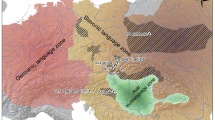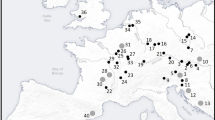Abstract
This essay argues that historical archaeology has the potential to complicate and challenge colonial narratives of authenticity, not only in the rich data that it collects and studies, but also in the ways in which it goes about collecting these data. Case studies from colonial New England exemplify the nuanced perspectives on native spirituality and community cohesion offered via historical archaeology. These complex and variegated archaeological histories have the potential to break the dichotomous tropes inherent in public understandings of colonialism. Recent historical archaeological research with the Brothertown Indian Nation also serves to demonstrate the ways in which critical, collaborative, and pragmatic approaches can challenge colonial narratives on a local scale.
Similar content being viewed by others
References
Otalay, Sonya 2006 Indigenous Archaeology as Decolonizing Practice. American Indian Quarterly 30(3&4):280–310.
Berkhofer, Robert F., Jr. 1978 The White Man’s Indian: Images of the American Indian from Columbus to the Present. Alfred A. Knopf, New York, NY.
Bragdon, Kathleen J. 1996 Native People of Southern New England, 1500–1650. University of Oklahoma Press, Norman.
Brenner, Elise M. 1986 Archaeological Investigations at a Massachusetts Praying Indian Town. Bulletin of the Massachusetts Archaeological Society 47(2):69–77.
Brooks, Joanna (editor) 2006 The Collected Writings of Samson Occom, Mohegan. Oxford University Press, Oxford, UK.
Bross, Kristina, and Hilary E. Wyss 2008 Introduction. In Early Native Literacies in New England: A Documentary and Critical Anthology, Kristina Bross and Hilary E. Wyss, editors, pp. 1–14. University of Massachusetts Press, Amherst.
Cipolla, Craig N. 2008 Signs of Identity, Signs of Memory. Archaeological Dialogues 15(2):196–215.
Cipolla, Craig N. 2010 The Dualities of Endurance: A Collaborative Historical Archaeology of Ethnogenesis at Brothertown, 1780–1910. Doctoral dissertation, Department of Anthropology, University of Pennsylvania. University Microfilms, Ann Arbor, MI.
Cipolla, Craig N. 2011 Commemoration, Community, and Colonial Politics at Brothertown. Midcontinental Journal of Archaeology 36(2):145–172.
Cipolla, Craig N. 2012a Peopling the Place, “Placing” the People: An Archaeology of Brothertown Discourse. Ethnohistory 59(1):51–78.
Cipolla, Craig N. 2012b Textual Artifacts, Artifactual Texts: An Historical Archaeology of Brothertown Writing. Historical Archaeology 46(2):91–109.
Cipolla, Craig N. 2013a Becoming Brothertown: Native American Ethnogenesis and Endurance in the Modern World. University of Arizona Press, Tucson.
Cipolla, Craig N. 2013b Resituating Homeland: Motion, Movement & Ethnogenesis at Brothertown. In Archaeologies of Mobility and Movement, Mary C. Beaudry and Travis G. Parno, editors, pp. 117–132. Springer Press, New York, NY.
Cipolla, Craig N., Stephen W. Silliman, and David B. Landon 2007 ‘Making Do’: Nineteenth-Century Subsistence Practices on the Eastern Pequot Reservation. Northeast Anthropology 74:41–64.
Cogley, Richard W. 1999 John Elliot’s Mission to the Indians before King Philip’s War. Harvard University Press, Cambridge, MA.
Cothran, Boyd 2010 Working the Indian Field Days: The Economy of Authenticity and the Question of Agency in Yosemite Valley. American Indian Quarterly 34(2):194–223.
Crosby, Constance A. 1988 From Myth to History, or Why King Philip’s Ghost Walks Abroad. In The Recovery of Meaning: Historical Archaeology in the Eastern United States, Mark P. Leone, and Parker B. Potter, editors, pp. 183–210. Smithsonian Institution Press, Washington, DC.
DeForest, John W. 1964 History of the Indians of Connecticut: From the Earliest Known Period to 1850. Shoestring Press, Hamden, CT.
Deloria, Philip J. 1998 Playing Indian. Yale University Press, New Haven, CT.
Deloria Vine, Jr., and Clifford M. Lytle 1983 American Indians, American Justice. University of Texas Press, Austin.
Den Ouden, Amy 2005 Beyond Conquest: Native Peoples, Reservation Land, and the Struggle for History. University of Nebraska Press, Lincoln.
Ferris, Neal 2009 The Archaeology of Native-Lived Colonialism: Challenging History in the Great Lakes. University of Arizona Press, Tucson.
Gosden, Chris 2004 Archaeology and Colonialism: Cultural Contact from 5000 BC to the Present. Cambridge University Press, Cambridge, UK.
Grim, John A. 1996 Cultural Identity, Authenticity, and Community Survival: The Politics of Recognition in the Study of Native American Religions. American Indian Quarterly 20(3&4):353–376.
Jarvis, Brad 2010 The Brothertown Nation of Indians: Land Ownership and Nationalism in Early America, 1740–1840. University of Nebraska Press, Lincoln.
Landrum, Cynthia L. 2012 Kicking Bear, John Trudell, and Anthony Kiedis (of Red Hot Chili Peppers): “Show Indians” and Pop- Cultural Colonialism. American Indian Quarterly 36(2):182–214.
Leone, Mark P., Parker B. Potter, and Paul A. Shackel 1987 Toward a Critical Archaeology. Current Anthropology 28(3):283–302.
Locke, John 1821 Two Treatises of Government. Whitmore and Fenn, London, UK.
Loren, Diana Dipaolo, and Mary C. Beaudry 2006 Becoming American: Small Things Remembered. In Historical Archaeology, Martin Hall and Stephen W. Silliman, editors, pp. 251–271. Blackwell, Malden, MA.
Love, William DeLoss 1899 Samson Occom and the Christian Indians of New England. Syracuse University Press, Syracuse, NY.
Lyons, Scott R. 2011 Actually Existing Indian Nations: Modernity, Diversity, and the Future of Native American Studies. American Indian Quarterly 35(3):295–312.
McBride, Kevin A. 1990 The Historical Archaeology of the Mashantucket Pequot. In The Pequots: The Fall and Rise of an American Indian Nation, Laurence Hauptman, and James Wherry, editors, pp. 96–116. University of Oklahoma Press, sNorman.
McBride, Kevin A. 1993 “Ancient and Crazie”: Pequot Lifeways during the Historic Period. In Algonkians of New England: Past and Present, Peter Benes, editor, pp. 63–75. Boston University, Boston, MA.
McBride, Kevin A. 1996 The Legend of Robin Cassacinamon: Mashantucket Leadership in the Historic Period. In Northeastern Indian Lives, 1632–1816, Robert Grumet, editor, pp. 74–93. University of Massachusetts Press, Amherst.
McDavid, Carol 2002 Archaeology as Cultural Critique: Pragmatism and the Archaeology of a Southern United States Plantation. In Philosophy and Archaeological Practice: Perspectives for the 21st Century, Cornelius Holtorf and Hakan Karlsson, editors, pp. 221–232. Bricoleur Press, Gothenburg, Sweden.
McGuire, Randall H. 1992 Archaeology and the First Americans. American Anthropologist 94(4):816–836.
McGuire, Randall H. 2004 Contested Pasts: Archaeology and Native Americans. In A Companion to Social Archaeology, Lynn Meskell and Robert W. Preucel, editors, pp. 374–395. Blackwell, Malden, MA.
Miller, Christopher L., and George R. Hamell 1986 A New Perspective on Indian–White Contact: Cultural Symbols and Colonial Trade. Journal of American History 73(2):311–328.
Mrozowski, Stephen A. 2009 Christian Indian Communities in New England after King Philip’s War. In Archaeology in America: Northeast and Southeast, Francis P. MacManomon, editor, pp. 143–147. Greenwood Press, Westport, CT.
Mrozowski, Stephen A., Holly Herbster, David Brown, and Katherine L. Priddy 2009 Magunkaquog Materiality, Federal Recognition, and the Search for a Deeper History. International Journal of Historical Archaeology 13(4):430–463.
Murray, Laura J. (editor) 1998 To Do Good to My Indian Brethren: The Writings of Joseph Johnson, 1751–1776. University of Massachusetts Press, Amherst.
Nicholas, George P., and Thomas D. Andrews 1997 Indigenous Archaeology in the Postmodern World. In At a Crossroads: Archaeology and the First Peoples in Canada, George P. Nicholas and Thomas D. Andrews, editors, pp. 1–18. Simon Fraser University, Burnaby, BC.
O’Brien, Jean M. 1997 Dispossession by Degrees: Indian Land and Identity in Natick, Massachusetts, 1650–1790. Cambridge University Press, Cambridge, UK.
Office of Federal Acknowledgement 2011 Office of Federal Acknowledgement Guidelines and Precedent Manual. Bureau of Indian Affairs <http://www.bia.gov/WhoWeAre/AS-IA/OFA/OFAGuidelines/index.htm>/WhoWeAre/AS-IA/OFA/OFAGuidelines/index.htm>. Accessed 17 February 2011.
Palus, Matthew M., Mark P. Leone, and Matthew D. Cochran 2006 Critical Archaeology: Political Past and Present. In Historical Archaeology, Martin Hall and Stephen W. Silliman, editors, pp. 84–106. Blackwell, Malden, MA.
Potter, Parker B. 1994 Public Archaeology in Annapolis: A Critical Approach to History in Maryland’s Ancient City. Smithsonian Institution Press, Washington, DC.
Rubertone, Patricia 2001 Grave Undertakings: An Archaeology of Roger Williams and the Narragansett Indians. Smithsonian Institution Press, Washington, DC.
Ruppel, Kritsten T. 2008 Unearthing Indian Land: Living with the Legacies of Allotment. University of Arizona Press, Tucson.
Sabloff, Jeremy A. 1998 Communication and the Future of Archaeology. American Anthropologist 100(4):869–875.
Sabloff, Jeremy A. 2008 Archaeology Matters: Action Archaeology in the Modern World. Left Coast Press, Walnut Creek, CA.
Saitta, Dean J. 2003 Archaeology and the Problems of Men. In Essential Tensions in Archaeological Method and Theory, Todd L. Van Pool, Christine S. Van Pool, editors, pp. 11–16. University of Utah Press, Salt Lake City.
Salisbury, Neal 1974 Red Puritans: The “Praying Indians” of Massachusetts Bay and John Eliot. William and Mary Quarterly, 3rd. ser., 31(1):27–54.
Seeman, Erik R. 2010 Death in the New World: Cross-Cultural Encounters, 1492–1800. University of Pennsylvania Press, Philadelphia.
Silliman, Stephen W. 2009 Change and Continuity, Practice and Memory: Native American Persistence in Colonial New England. American Antiquity 76(1):211–230.
Silliman, Stephen W. (editor) 2008 Collaborating at the Trowel’s Edge: Teaching and Learning in Indigenous Archaeology. University of Arizona Press, Tucson.
Silliman, Stephen W., and Katherine H. Sebastian Dring 2008 Working on Past for Futures: Eastern Pequot Field School Archaeology in Connecticut. In Collaborating at the Trowel’s Edge: Teaching and Learning in Indigenous Archaeology, Stephen W. Silliman, editor, pp. 67–87. University of Arizona Press, Tucson.
Silliman, Stephen W., and Thomas A. Witt 2010 The Complexities of Consumption: Eastern Pequot Cultural Economics in 18th-Century Colonial New England. Historical Archaeology 44(4):46–68.
Silverman, David J. 2001 The Impact of Indentured Servitude on the Society and Culture of Southern New England Indians, 1680–1810. New England Quarterly 74(4):622–666.
Silverman, David J. 2010 Red Brethren: The Brothertown and Stockbridge Indians and the Problems of Race in Early America. Cornell University Press, Ithaca, NY.
Simmons, William Scranton 1970 Cautantowwit’s House: An Indian Burial Ground on the Island of Conanicut in Narragansett Bay. Brown University Press, Providence, RI.
Simmons, William Scranton 1986 Spirit of the New England Tribes: Indian History and Folklore. University Press of New England, Hanover, NH.
United States Department of the Interior 2009 Proposed Findings against Acknowledgment of the Brothertown Indian Nation, 17 August. Bureau of Indian Affairs <http://www.bia.gov/WhoWeAre/AS-IA/OFA/RecentCases/index.htm>/WhoWeAre/AS-IA/OFA/RecentCases/index.htm>. Accessed 10 August 2010.
Vitelli, Giovanna 2009 Equilibrium, Well-Being, and Exchange: The Basis of Algonquian Mortuary Practice in Seventeenth Century Southern New England. Doctoral dissertation, Department of Archaeology, University of Reading, Reading, UK.
White, Richard 1991 The Middle Ground: Indians, Empires, and Republics in the Great Lakes Region, 1650–1815. University of Cambridge Press, Cambridge, UK.
Wilcox, Michael 2010 Marketing Conquest and the Vanishing Indian. Journal of Social Archaeology 10(1):92–117.
Williams, Bryn 2013 Can You Trust Jared Diamond? Slate <http://www.slate.com/articles/health_and_science/books/2013/02/jared_diamond_the_world_until_yesterday_anthropologists_are_wary_of_lack.html>. Accessed 18 February 2013.
Williams, Roger 1973 A Key into the Language of America, J. J. Teunissen and E. J. Hinz, editors. Wayne State University Press, Detroit, MI.
Author information
Authors and Affiliations
Rights and permissions
About this article
Cite this article
Cipolla, C.N. Native American Historical Archaeology and the Trope of Authenticity. Hist Arch 47, 12–22 (2013). https://doi.org/10.1007/BF03376905
Published:
Issue Date:
DOI: https://doi.org/10.1007/BF03376905




